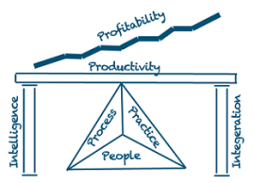7 Ethical Codes of Conduct for IT Consultants and Contractors
December 21, 2011 1 Comment
Ethics are important for everyone in any type of business. Ethics are certain set codes of conduct that a person follows and is identified with in his or her professional life. When it comes to being an employee there are certain work ethics that are common across the industries and that need no separate emphasis. There could just be a few incumbent codes of conduct which may be very industry-specific or specific to a company. Such codes of conduct may need special mention when a new recruit joins that company.
But when it comes to being a contractor or a consultant you may have to be extra cautious. The playing field here is quite different from that of an employee. So, what are these special codes of conducts that should define your work ethics as a consultant or as a contractor? I have listed 7 of them here. There could be more and it would be great if you could share them with us in the comments below:
1. Keep the Faith
Yes, you must try and ‘Keep the Faith’ of your client. When a client hires you, he places a lot of professional trust in you and your services. You must try and account for your services properly and honestly. Don’t break the trust by falsely increasing or misquoting those hours that you spend on the project, just to make that extra buck. If it gets revealed at a later date, then it will lead to premature termination of your contract and a bad word-of-mouth for you.
2. Don’t Make False Promises
No matter how tempting it might be financially, do not make false promises in order to get more business. You may get the business by bloating your technical skills, but when you underperform, it will do you more damage to your reputation than you think.
3. Don’t Break Confidentiality
When you are hired as a consultant you may come across certain confidential data as a result of special requirements of the services that you provide. For example, if you are a DB Consultant with an Investment Bank, then you maybe maintaining and updating millions of customer accounts for many of the Bank’s services. Never sneak out data in any form.
You may at times also come across proprietary data of two clients who are in the same industry. As a part of your professional work ethics, you must disclose it to your client when you are working for direct competitors. This may lead you to sign confidentiality agreement with the client, but even if not, it becomes a part of your professional code of conduct to not reveal proprietary data to competitors.
4. Don’t Recommend Unnecessary Products
It is a common practice with product vendors to rope in successful consultants to recommend their products to companies. Many times this is tied-up to a commission. It is advisable to stay away from recommending unnecessary products to your clients no matter how lucrative the commission being offered by the product vendor is. Providing unnecessary recommendations do not speak very high of you.
5. Document Backdoor and Debug Options
Seasoned developers usually write applications with a backdoor and debug options which provide quick and unrestricted access to programmers to the application. While these backdoor and debug options are of great significance when the application is still in development stage, but when it goes live, these backdoor and debug options can provide easy access to hackers. So, if you are a developer contractor, and you happen to leave a client before your application goes live, it should be a part of your professional ethic to provide documentation for all the backdoors and debug options that you have created.
6. Ensure Clear Communications
When defining the scope of any project, always make sure that the ambiguities are cleared early. You must also ensure that the right set of people is always in the chain of discussions. Your professional code of conduct must make you stay clear of biases, communicate properly and treat every stakeholder with equal respect and importance.
If you think any work is beyond the scope of your proposals, then you must speak-up about it early. It may create bitterness later if you procrastinate such discussions.
7. Don’t Do Anything Illegal
No matter how attractive a deal is, illegal is illegal. Never indulge anything that doesn’t sound legal according to you. Learn to emphatically say no. Otherwise, you never know, but you might be digging your own grave. If the client is sued for any illegal practice, and you happen to be a part of it in any way, you will lose your credibility too. This is what exactly happened to Arthur Andersen. They got caught of the fraudulent practices that they made while handling Enron’s audits. Although in May 2005, the Supreme Court reversed their felony, they could never come back into business because their reputation was so severely tarnished.
